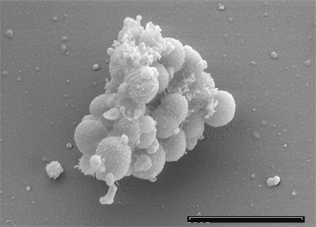User:S4354350: Difference between revisions
No edit summary |
No edit summary |
||
| Line 4: | Line 4: | ||
Date 31/08/2016 | Date 31/08/2016 | ||
<ref>MICR3004</ref> | <ref>MICR3004</ref> | ||
[[Image:veipa.jpg|frame|right|150px| Scanning electron microscope image of ''V. parvula'' Te3 strain]] | |||
==Classification== | ==Classification== | ||
| Line 14: | Line 14: | ||
===Species=== | ===Species=== | ||
Veillonella parvula; Prévot Te3T (= DSM 2008 = ATCC 10790 = JCM 12972) | Veillonella parvula; Prévot Te3T (= DSM 2008 = ATCC 10790 = JCM 12972) | ||
==Description and significance== | ==Description and significance== | ||
Revision as of 10:00, 22 September 2016
Name Morgan Freney Student No. 43543504 Bench ID B Date 31/08/2016 [1]
Classification
Higher order taxa
Kingdom: Bacteria, Phylum: Firmicute, Class: Negativicutes, Order: Selenomonadales, Family: Veillonellanceae, Genus: Veillonella, Species: Parvula
In 2010, the genus Veillionella was emended by Marchandin and colleagues who reclassified all 26 genera of the Selenomonas-Megasphaera-Sporomusa group to the new order Selenomonadales in the new class Negativicutes, and divided into two families; Acidaminococcaceae and Veillonellaceae.
Species
Veillonella parvula; Prévot Te3T (= DSM 2008 = ATCC 10790 = JCM 12972)
Description and significance
Give a general description of the species (e.g. where/when was it first discovered, where is it commonly found, has it been cultured, functional role, type of bacterium [Gram+/-], morphology, etc.) and explain why it is important to study this microorganism. Examples of citations [1], [2]
Genome structure
Select a strain for which genome information (e.g. size, plasmids, distinct genes, etc.) is available.
Cell structure and metabolism
Cell wall, biofilm formation, motility, metabolic functions.
Ecology
Aerobe/anaerobe, habitat (location in the oral cavity, potential other environments) and microbe/host interactions.
Pathology
Do these microorganisms cause disease in the oral cavity or elsewhere?
Application to biotechnology
Bioengineering, biotechnologically relevant enzyme/compound production, drug targets,…
Current research
Summarise some of the most recent discoveries regarding this species.
References
References examples
- ↑ MICR3004
This page is written by Morgan Freney for the MICR3004 course, Semester 2, 2016

